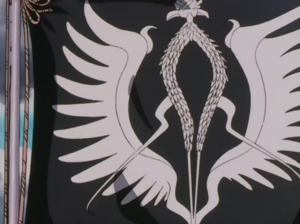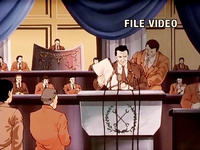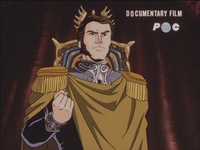Galactic Empire
From Gineipaedia, the Legend of Galactic Heroes wiki
The Galactic Empire (Japanese: 銀河帝国) was an interstellar nation which encompassed most of the human colony worlds within the galaxy. Ruled by a kaiser (or emperor), the Empire was, for much of its history, an autocratic monarchy structured around a rigid European-style feudal system. The Galactic Empire was established in 310 UC (1 IC / 3110 CE) by Rudolf von Goldenbaum, the first emperor of the Goldenbaum Dynasty. Its flag was the white crest of the Goldenbaum Dynasty, a stylised crowned two headed eagle, on a black background. The seat of government was based on the planet Odin, in the Imperial palace of Neue Sanssouci. Following numerous social and political reforms after the Imperial Civil War, the Galactic Empire was eventually reorganised into the New Galactic Empire with the abdication of the last Goldenbaum ruler, Katharin Kätchen, in favour of Reinhard von Lohengramm in 799 UC (1 NIC / 490 IC / 3599 CE).
Contents |
History
Precursors to empire
The history of the Galactic Empire began with the Golden Age of Humanity: under the supervision of the Galactic Federation, humankind spread out across the galaxy: exploring, settling, discovering. For two centuries humanity enjoyed an age of unprecedented peace and prosperity. But it was not to last. By the third century of the Universal Calendar, the galaxy had entered into a period of stagnation. The great Galactic Federation was decaying, rotting from the inside.
Desperate to restore their nation to its former glory, the people of the Federation turned to a war hero-turned-politician to guide them. In 296 UC (3096 CE), Rudolf von Goldenbaum was elected to Parliament. He founded the National Reform Alliance, a radical right-wing political party that gained complete control of the Federation government in a single decade. The NRA propelled Rudolf to the heights of Federation power: by 308 UC (3108 CE) he was both the Prime Minister and the President of the Federation — and the single most powerful man in human history, due to taking advantage of a loophole that did not explicitly forbid the same person from holding both positions at the same time.
Rudolf's determination and will became the guiding light of the Galactic Federation. His reforms curtailed many basic freedoms of the Federation citizens, yes, but crime and delinquency rates fell to unheard of lows. In 308 UC (3108 CE) Rudolf declared himself "president for life," and the people cheered. Two years later (in 310 UC (1 IC / 3110 CE) he proclaimed himself the first emperor of the Galactic Federation, and there were endless parades in his honor. (LOGH: 'Julian's Journey, Mankind's Journey')
Laying the foundation
The vestiges of democracy did not die quietly. Upon his ascension to the throne, Emperor Rudolf von Goldenbaum immediately set to the task of reforging the Federation into a true Empire. For an entire decade, he consolidated his power, and in 318 UC (9 IC / 3118 CE) Rudolf announced the Inferior Genes Exclusion Act, a galaxy-wide policy of mass-murder and persecution based on his social Darwinist views. People with lifestyles or genetic conditions deemed unhealthy to the state were sterilised, imprisoned and executed.Most social welfare programs were abolished. The Department of Social Discipline was founded — a secret police force that enforced Rudolf's reign of terror, brutalising the people and executing any deemed enemies of the state.
From his allies, Rudolf formed an Imperial aristocracy — the Nobility — to serve as the backbone of his Empire. These plutocrats would soon come to control virtually all of the wealth and power in the Galaxy. It was noted that all of the newly created nobles were of white Caucasian background and they were all granted Germanic names, perhaps reflecting Rudolf's own biases. The old Imperial Senate, which had been formed from the parliament which had governed the Federation for centuries, was permanently dissolved; freedom of speech rescinded. millions perished in the fires of Rudolf's revolution: and those who survived kept quiet, for fear of their own mortality. (LOGH: 'Julian's Journey, Mankind's Journey')
Uprising and revolt
When Rudolf von Goldenbaum died in 351 UC (42 IC / 3151 CE), the people of the Empire rejoiced. The civilised worlds of the galaxy erupted in democratic revolution. Finally, it seemed the Empire's reign of terror would disappear and the worlds would once more regain the freedoms they had lost. With Rudolf's death, the dream of freedom was rekindled in the heart of every citizen on every world.
But such dreams seldom come true. Rudolf's aristocracy was powerful. Rudolf's heir and grandson, Kaiser Sigismund I aided by his father and Prime Minister, Joachim von Neue Stauffen, brutally quelled each revolt one after another. To punish them for their vain hopes, the free citizens of the Galactic Empire found themselves stripped of what few rights they had remaining. No longer citizens, they became serfs. Forced to live servile lives to the plutocrat nobles, no longer capable of commanding their own destinies.
Sigismund I's reign was brutal, and despite all of the blood spilled (or perhaps because of it), it was instrumental in consolidating the Empire's power and firmly establishing it as the sole and permanent government of all humanity. Though there was still widespread discontent among the Empire's population, most now reduced to serfdom, the oppressed found themselves too terrified of the Kaiser to even consider opposing him. This constant state of fear would ensure the Empire's survival through the succession of rulers who would succeed Sigismund I to the throne, and ensure the unquestioned authority of the Empire for centuries. (LOGH: 'Julian's Journey, Mankind's Journey'; Legend of Galactic Heroes Encyclopedia)
The Great War
In 640 UC (331 IC / 3440 CE) the Galactic Empire made first contact with the Free Planets Alliance, and began the Alliance–Imperial War. Founded more than a century prior in 527 UC (218 IC / 3327 CE) by the exiles of Arle Heinnesen, the Free Planets Alliance was a democratic nation, founded in direct opposition to Imperial ideology. Refusing to recognise the Alliance government and decrying the Alliance as rebels mounting an insurrection against the throne, Kaiser Friedrich III dispatched an Imperial fleet under the command of Grand Duke Herbert through the Iserlohn Corridor to invade the Alliance. From the time of Rudolf I, the Empire had been undefeated in battle, and since the reign of Sigismund I, the Empire had never faced any legitimate threats to its authority; the high nobles therefore naturally assumed that their invasion of the Alliance would be no different — and were stunned when the Alliance forces, under the command of Admiral Lin Pao, defeated the Imperial fleet in what would later be known as the Battle of Dagon. The defeat would trigger a mass exodus of refugees, dissidents, disaffected nobles, and criminal elements to the Alliance, swiftly increasing its size and power. The war itself soon stalemated with the front line located in the Iserlohn Corridor. The Empire remained on the offensive at the strategic level, but its attacks were either defeated by the Alliance or failed to make any lasting gains. By 798 UC (489 IC / 3598 CE), the Empire's total population was estimated to be around 25 billion. (LOGH: 'Julian's Journey, Mankind's Journey')
The Imperial Civil War
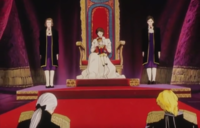
In November of 797 UC (488 IC / 3597 CE), the emperor of the Galactic Empire, Kaiser Friedrich IV died suddenly of a heart attack. Leaving no male heirs, the Imperial Court was thrown into chaos as it tried to determine Friedrich IV's successor.
Three potential candidates to the Goldenbaum crown soon emerged, all of them grandchildren of Friedrich IV: Elisabeth von Braunschweig, supported by her father, Duke Otho von Braunschweig; Sabine von Littenheim, supported by her father as well, Marquis Wilhelm von Littenheim; and lastly Erwin Josef II, Friedrich's five-year old grandson, supported by Imperial Minister of State, Duke Klaus von Lichtenlade.
All three candidates for the throne were supported by powerful nobles, but only one would gain the support of the Imperial Fleet as well: Fleet Admiral of the Imperial Fleet, Reinhard von Lohengramm lent his considerable power to the cause of Erwin Josef II and duly crowned him as Kaiser. The political alliance between Reinhard and the Minister of State, Lichtenlade, frightened many of the High Nobles. This fear prompted Littenheim and Braunschweig to put aside their own dispute and form the Lippstadt League, gathering many other fearful High Nobles to their cause. (LOGH: 'New Trends', 'The Lippstadt Conspiracy')
The Lippstadt League conspired against the Imperial Government, planning to launch a pre-emptive assault on the Imperial Capital to arrest both Lichtenlade and Reinhard. Information of the planned coup leaked to Reinhard von Lohengramm's admiralty, however, and he moved immediately to arrest the conspirators for treason. Of the total 3760 high nobles that joined the Lippstadt League, 625 were arrested, but the ringleaders of the conspiracy, Littenheim and Braunschweig, managed to escape Odin. Together, they fled to Geiersburg Fortress and marshalled their forces, determined to settle things with Reinhard on the field of battle. (LOGH: 'The Lippstadt Conspiracy')
Though ostensibly under the authority of High Admiral Merkatz and numerically superior to Reinhard's forces, the Lippstadt League's fleets were undisciplined and disordered. After suffering a string of defeats, the Lippstadt League was forced to withdraw to the immediate vicinity of Geiersburg, and was soon encircled by Reinhard's forces.
While waiting in isolation inside the safety of Geiersburg, Braunschweig learned of a peasant revolt on the planet Westerland, one of his fiefs. Incensed at the temerity of the peasants, Braunschweig ordered a nuclear attack on the world. Though Reinhard von Lohengramm learned of Braunschweig's attack in advance of it, due to the manoeuvring of Paul von Oberstein he was unable to prevent the massacre. (LOGH: 'Bloodshed in Space', 'Courage and Loyalty')
After a particularly bloody attempt to break the siege, led by Baron Flegel ended in failure, the Imperial Fleets, fully unified by their hatred of the High Nobles' thanks in no small part to the massacre at Westerland, managed to conquer Geierberg fortress with relative ease. The leader of the Lippstadt League, Otho von Braunschweig, was forced to commit suicide by his aide Ansbach. (LOGH: 'The Fall of Goldenbaum')
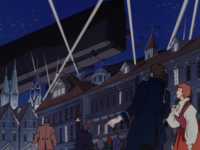
Shortly after the defeat of the Lippstadt League at Geiersburg, Ansbach attempted to murder Reinhard von Lohengramm. He failed, killing Imperial High Admiral Siegfried Kircheis instead. Reinhard's chief advisor, Paul von Oberstein, declared that the conspirators in the assassination attempt had to be brought to justice: furthermore, he declared that Reinhard's one-time ally, Minister of State Klaus von Lichtenlade, was the culprit. Two Imperial fleets led by Oskar von Reuenthal and Wolfgang Mittermeyer were dispatched to Odin with all possible haste. Thousands of warships descended through the skies of the Imperial City: Wolfgang MIttermeyer seized the Imperial Seal, the symbol of the emperor's authority, at Neue Sanssouci; Oskar von Reuenthal arrested Lichtenlade, and forced him to commit suicide. (LOGH: 'The Day Before Destiny', 'Farewell, Distant Memories')
By the time the bulk of Reinhard's fleets reached Odin, the Imperial capital world was completely under his control. Erwin Josef II, 37th Kaiser of the Goldenbaum Dynasty, ruled in name only as now Duke Reinhard von Lohengramm himself ruled over the Empire as both Fleet Admiral and Commander of the Imperial Fleet and Prime Minister of the Empire. (LOGH: 'Farewell, Distant Memories')
Reformation and war
The Empire saw numerous democratic reforms upon the ascension of the 37th Kaiser, Erwin Josef II, to the throne in 797 UC (488 IC / 3597 CE). These reforms were instigated by the newly-appointed Prime Minister, Reinhard von Lohengramm, who set about restoring to the people the various rights and liberties that had been stripped from them by Rudolf von Goldenbaum so many centuries earlier. The Empire's finances were restored through confiscation of the assets of the defeated nobles of the Lippstadt League. (LOGH: 'First Battle')
Eager to maintain the war against the Free Planets Alliance, Reinhard authorised a bold plan to pit Geiersberg Fortress directly against Iserlohn Fortress in what would become the Eighth Battle of Iserlohn. The Imperial fleets and fortress were defeated, and Admiral Karl Gustav Kempff lost his life in the attack. (LOGH: 'Fortress vs Fortress')
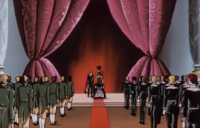
On 6 July 798 UC (489 IC / 3598 CE), the young Emperor of the empire, Erwin Josef II, was abducted by former High Nobles and taken to the Free Planets Alliance, where he became the figurehead of a government-in-exile. This provided Reinhard with a justification for further military action. In order to punish the remaining high-nobles who had escaped justice at the end of the Imperial Civil War, Reinhard von Lohengramm organised an invasion of the Free Planets Alliance, code-named Operation Ragnarök. (LOGH: 'The Abduction of the Young Emperor')
Shortly after the 8-month old Katharin Kätchen was crowned Kaiserin of the Galactic Empire, Operation Ragnarök commenced: while the Free Planets Alliance was distracted by the Ninth Battle of Iserlohn, multiple Imperial fleets penetrated Alliance territory through the Fezzan Corridor. The Alliance mustered its forces at the Battle of Rantemario, but were defeated, but saved from being completely annihilated by the arrival of Yang Wen-li and his fleet. After regrouping at Heinessen Yang Wen-li led a guerilla campaign against the Imperial supply lines and defeated 3 Imperial fleets in succession. Reinhard directly engaged the Alliance fleets (this time under the command of Yang Wen-li) at the Battle of Vermilion. Although Yang Wen-li managed a tactical victory over Reinhard's forces, he was forced to surrender to the Imperial Fleet after Wolfgang Mittermeyer and Oskar von Reuenthal assaulted the Alliance capital, Heinessen, and the High Council surrendered to the Galactic Empire unconditionally. (LOGH: 'The Arrow Is Released', 'Operation: Ragnarök', 'The Two-Headed Snake: The Battle of Rantemario', 'The Battle of Vermilion (Part One)', 'The Battle of Vermilion (Part Two)', 'Sudden Change')
Hostilities between the Empire and the Alliance were formally ended in May with the Treaty of Ba‘alat. The following month, Katharin Kätchen's regent would abdicate the Imperial throne, and Reinhard von Lohengramm would become the first emperor of the New Galactic Empire. (LOGH: 'Long Live the Emperor!')
Society
Politics
The Galactic Empire was an absolute monarchy with the Kaiser in theory wielding unlimited power. In practice, the Kaiser's power was constrained by the power of the nobility, who were often responsible for the Kaiser gaining the throne and who also posed a threat of revolt or assassination.
The head of government was the prime minister, until Otfried III served as prime minister during his time as crown prince. Since then, that office was left officially vacant and taboo, with its role taken up by the minister of state, who was the acting prime minister. The position of prime minister would not be filled again until Klaus von Lichtenlade assumed that position during or shortly after the Imperial civil war.
As the nobility tightened its grip on Imperial power, they gradually abolished the process of promotion. In the earliest years of the Empire, common citizens who sufficiently proved their value or ability could be elevated to the ranks of nobility (or even purchase a noble title, should their own merits prove insufficient). This process of promotion allowed for a degree of upward social mobility in Imperial society, giving hope to even the lowest social classes that, through hard work, they could make a better life for themselves. Naturally, the high nobles were wary of any competition, and within a century, such hopes were futile. Imperial society — art, politics, literature, and music — entered a long period of stagnation when the aristocracy almost ceased the practice of 'ascending' regular citizens into their ranks entirely.
Foreign policy
The Empire technically had no foreign policy as it laid claim to being the sole government over all of humanity. It did not recognize the Free Planets Alliance as a nation and they were always called the "rebels" officially within the Empire.
Officially the Empire claimed to be liberating the people of the planets it conquered from the "evil" Alliance. The captured populations would be sent to forced labour on the frontier for the rest of their lives in order to "rectify" them of their irrational beliefs in republicanism. (SL: 'The Hero of El Facil')
The Imperial government maintained a diplomatic mission on Fezzan, to represent its interests in the Dominion, although Fezzan was technically under the authority of the Emperor. The Fezzani autonomous government also had its own diplomatic representation on Odin.
Economy
The Galactic Empire was organised as a feudal state, with individual planets being little more than the private fiefdoms of local lords. The outlying regions of the Empire (possibly equivalent to the Frontier Worlds of the old Federation) were mostly pastoral, agrarian worlds, with only a few planets being fully industrialised, economic hubs.
Deriving their power directly from the Kaiser, the nobles were given complete freedom with regard to their treatment (and governance) of their serfs, who were regarded as little more than property. Relations between the noble houses, however, were considerably more regulated. Property disputes were arbitrated by government officials, but could be settled privately, with a joust or duel. The courts were also known to almost (universally) favour noble families over commoners. In addition, the aristocracy enjoyed freedom from taxation since the time of Rudolf the Great and an accompanying resistance to amending that long standing rule.
The major noble houses amassed great estates and vast private wealth. Those nobles that participated in the Lippstadt League had most of their wealth confiscated by the victorious Reinhard von Lohengramm to replenish the national treasury.
Its currency was the Imperial Mark. (Legend of Galactic Heroes Gaiden Volume 1: The Star Crusher: 'Cobweb')
Culture
The Galactic Empire's culture was heavily influenced by Rudolf von Goldenbaum's Germanic biases. He crafted a society modelled off 18th century Prussia and the Ancien Régime of France, and with its nobility filled with only white people of Germanic descent (or those that could pass for it). This extended to architecture and styles of clothing.
Freedom of speech did not exist within the Empire. Secret police kept a watch on civilians and could arrest anyone suspected of activities or thoughts against the war, against the Kaiser, or in favour of democracy. Official representations of the founder of the Empire or the currently reigning Kaiser were sacrosanct and it was both illegal and taboo to damage them. (DMSN: 'Chapter I'; LOGH: 'The Klopstock Incident')
Military service for male commoners was mandatory upon reaching the age of 20 for a minimum of 2 years. Those engaged in research in universities could apply for exemption, but in practice this would be granted only to those in fields considered "useful" by the Ministry of War such as medicine or engineering. The patriarchal theme within Imperial culture meant females did not serve in any role in the military. (HBSHBL: 'Candidate for Succeeding a Count's Family')
Corruption
Since breeding was the biggest factor in one's social status, Imperial society bent itself in favour of the nobility and it was rare for commoners to attain high social status or military rank. In the military, high nobles often were promoted simply for being of the nobility. Fleet commanders were such because of their blood and not because of their capability. Lesser nobles and commoners simply had to appease a given high noble to progress in life. Nobles with sufficient influence could ensure they and their relatives got military postings far from the front lines. (DMSN: 'Chapter I')
Corruption and waste was endemic throughout the Imperial military. Because high nobles and commanding officers often used bribery and embezzling, company grade officers likewise resorted to such tactics. High nobles also felt entitled to steal from the good of the Empire to pursue their own interests. Misappropriation of supplies for personal use or resale was common, and as much as one third of all food shipments went stale due to logistical inefficiency in shipping. Both issues had become so common and widespread that it was even regarded as a "necessary evil", to be kept in check rather than to be eliminated. (DUEL: 'Chapter I')
The Empire attempted to prosecute some cases, but because of meddling by nobles, only the highest profile cases were prosecuted. For example, Eugen von Castrop got away with a great deal of graft. It was only prosecuted after he passed away and no one saw the profit in defending the dead. That prosecution then resulted in the Castrop Rebellion.
The corruption and inefficiency within the Empire meant that despite having better technology, more territory, and nearly double the population of the Free Planets Alliance, the Empire as a nation had only 20% more power than the Alliance as of 796 UC (487 IC / 3596 CE) prior to the Battle of Astarte. (LOGH: 'First Battle', 'Julian's Journey, Mankind's Journey')
It was suggested within the Ministry of Finance that some graft could be recouped if the nobility was taxed, but there was resistance to changing that tradition which had begun with Rudolf.
Ethnic policies
Due to Rudolf's Germanic biases and the resulting all-white nobility, it is reasonable to assume that, at least in the Empire's early history, marginalisation of non-white minorities was prevalent. Due to the sheer amount of ethnic diversity within the Free Planets Alliance by 730 UC (421 IC / 3530 CE), it is unlikely that the Inferior Genes Exclusion Act was applied to racial minorities within the Empire. It is, however, more likely that non-white ethnicities in the Empire were completely barred from joining the nobility or holding any meaningful positions, and that because of their total lack of upward advancement from the onset of Rudolf's ascension, these ethnic groups were eager and ready for an alternative. When the Battle of Dagon concluded, and the Alliance was revealed to the Imperial citizens, a flood of disgruntled Imperials defected to the Alliance and it would be logical that the vast majority of the non-white Imperials also left for the Alliance in this mass exodus.
While it is unrealistic to assume that Empire became 'all white' after the Battle of Dagon, there seems to have been a drastic reduction in the ethnically diverse populations within the Empire and a equally drastic rise in their numbers within the Alliance. This was so prevalent that by 730 UC (421 IC / 3530 CE) there were no non-whites seen within the Imperial military or citizenry and, conversely, the Alliance was seen to have very ethnically diverse population. This is not to say that there were no other ethnicities within the Empire, but their numbers were few enough that the racist policies likely put in place in the early Empire were no longer enforced and forgotten, replaced by the noble/commoner divide that marginalised all serfs as a collective rather than specific groups. This meant that in the later history of the Empire, racism was largely forgotten, clearing the way for a smoother transition when the diverse population of the former Alliance were integrated into the New Galactic Empire.
Appendices
Background information
- The Galactic Empire refers to the Alliance simply as the 'rebels'. A more accurate translation might be the 'rebel alliance', as the Japanese words used are identical to those used in the Japanese translation of Star Wars for the Galactic Empire and Rebel Alliance, respectively.
- The Lippstadt League is given the name 'rebel fleet' by Reinhard after they retreat to Geiersberg: this is the same name used to refer to the Free Planets Alliance fleet, and serves as an ironic piece of propaganda associating the Reinhard/Lichtenlade alliance as the legitimate Imperial government, and the high nobles as traitors.
- Much of the dynastic politics and the Imperial government positions were patterned off of Imperial China.
- The position of Prime Minister becoming vacant is a reference to the Imperial Chinese example of Crown Prince (later emperor) Li Shimin, and how his former position in the bureaucracy was left permanently vacant and taboo after he became emperor, since it was considered presumptuous (or to have dangerous implications of intending to usurp the throne) for anyone else to occupy the position once held by an emperor.
List of known ministries and departments
- Ministry of the Interior
- Ministry of Military Affairs
